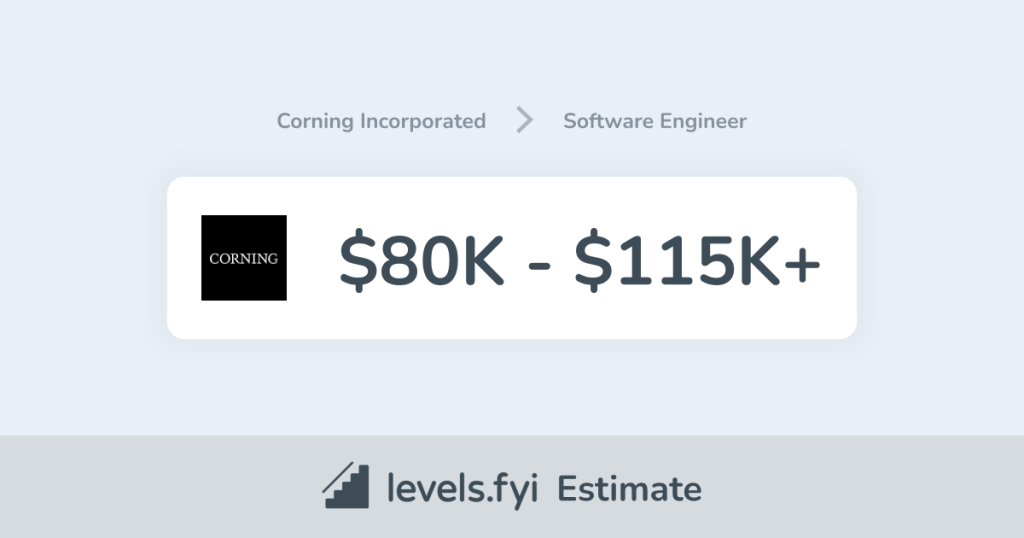
Corning Incorporated is a global technology company with a rich history of innovation in materials science, particularly glass. Here’s a quick look:
- Leading in Specialty Glass: Corning is a world leader in specialty glass, ceramics, and related materials with applications in various industries.
- From Light Bulbs to Touchscreens: Their inventions have played a pivotal role in technological advancements, from the glass envelope in early light bulbs to the Gorilla Glass® used in touchscreens.
- Global Presence: Corning operates manufacturing and research facilities worldwide.
What are the selection and Interview process of Corning?
The selection process at Corning can vary depending on the specific role (research scientist, engineer, production associate, sales representative), location, and experience level. Here’s a roadmap for what you might encounter:
1. Application: Submit your resume and cover letter through Corning’s careers website.
2. Screening and Review: Recruiters will carefully assess applications to identify candidates with the qualifications and experience outlined in the job description. They’ll focus on skills relevant to the specific role and industry (e.g., research experience and specific scientific knowledge for research scientist roles, technical skills and engineering background for engineering roles).
3. Interview Stages (may vary):
- Phone Interview (for some roles): An initial conversation with an HR representative or hiring manager to discuss your background, motivations, and interest in Corning’s areas of expertise, particularly their focus on innovation and developing cutting-edge materials solutions.
- In-Person Interview(s): These interviews may involve one or more rounds with hiring managers from relevant departments (e.g., research and development, engineering, production, sales) and potentially technical experts depending on the role. Here’s what you might encounter based on the role:
- Technical Roles (Research Scientist, Engineer): Be prepared for in-depth discussions about your technical background, relevant research or engineering experience, and problem-solving abilities. You might encounter technical drawings, case studies, or specific technical challenges related to Corning’s projects. For senior roles, presentations about your past research or engineering work might be expected.
- Production Associate Roles: Expect discussions about your experience in a manufacturing environment, ability to follow instructions and adhere to safety protocols, and willingness to work in a fast-paced environment.
- Sales Representative Roles: You might encounter discussions about your sales experience, understanding of the target market (depending on the specific Corning product or service being sold), and ability to build relationships with clients.
4. Additional Assessments (for some roles): Some positions may involve written or computer-based assessments to evaluate technical skills relevant to the role (e.g., knowledge of specific scientific principles for research scientist roles, basic engineering principles for engineering roles), or aptitude assessments.
5. Offer and Background Check: Successful candidates will receive a job offer contingent on a background check.
Tips for Success:
- Research Corning thoroughly, understanding their diverse areas of expertise in material science, commitment to innovation, and their contributions to technological advancements.
- Tailor your resume and cover letter to highlight relevant skills and experiences that demonstrate a strong fit for the specific role you’re applying to.
- Be prepared for discussions about your technical skills or relevant industry knowledge (depending on the role) and your passion for innovation and developing new materials solutions.
- Practice your behavioral interview skills using the STAR method (Situation, Task, Action, Result).
- Project a positive attitude, strong work ethic, and a willingness to learn (valuable in all roles!), excellent communication and interpersonal skills (especially for non-production roles).
By understanding Corning’s selection process and showcasing your qualifications and dedication to innovation, you can increase your chances of landing an interview and a rewarding career at this leading materials science company.
How many rounds of interview conducted in Corning?
The number of interview rounds at Corning can vary depending on the position you apply for, but here’s a general idea based on information found on job boards and employee reports:
- Number of Interview Rounds (Possible Range): 3 to 4 interviews [1, 2].
Here’s a possible breakdown of the interview stages at Corning:
- Initial Application: Submit your resume, cover letter, and you might encounter a web-based assessment about your skills or suitability for the role (often for some technical positions) [2].
- Phone Screen (Possible): A recruiter might conduct a brief phone interview to discuss your experience and interest in Corning [2].
- In-Person Interviews (Two to Three Rounds): These could involve discussions with [2]:
- Hiring Manager or Team Members from the department you’re applying for: They will assess your qualifications, experience (if any), and fit for the specific role (e.g., technical skills for engineering positions).
- Senior Managers or Directors (Possible for some roles): You might meet with senior managers or directors for a more in-depth discussion about the company culture, your potential contributions, and the specific role (more likely for experienced hires or higher-level positions).
- Presentation or Technical Discussion (Possible for some roles): In some cases, there might be a round involving a presentation about your skills and experience or a more technical discussion related to the role.
What is the salary for freshers in Corning?

Publicly available information on exact salaries for freshers at Corning isn’t advertised on their careers website [3]. Here are ways to get a better idea of the range for entry-level positions:
- Salary Websites: Explore salary websites like Glassdoor or Indeed. Search for “Corning” and filter by “entry-level” or “freshers” positions in your target location to get a sense of the range for similar roles (e.g., chemical engineer, production associate, quality control technician).
- Salary Negotiation: Be prepared to discuss salary during the offer stage, especially if you have relevant experience or a strong educational background in engineering, science, or a related field. Research salary ranges beforehand and highlight your skills and willingness to learn to justify your desired compensation.
Here are some additional tips for landing a job at Corning:
- Research Corning: Learn about their areas of expertise in glass and ceramics, optical communications, and life sciences [3]. Understand their focus on innovation, sustainability, and building a diverse workforce [3]. This demonstrates your genuine interest during the interview.
- Highlight Relevant Skills and Experience: Tailor your resume to showcase skills and experiences relevant to the specific role you’re applying for. This could include technical skills (for engineering or scientific positions), analytical skills, problem-solving abilities, a strong work ethic, and a willingness to learn.
- Prepare for Behavioral and Technical Questions: Be prepared to answer both behavioral questions using the STAR method (Situation, Task, Action, Result) to showcase your problem-solving skills and achievements, and technical questions relevant to the role (if applicable).
By following these steps, you’ll gain a better understanding of the potential interview process and salary range for freshers at Corning. Remember, the specific details can vary depending on the position you apply for, your qualifications, and the company’s needs at the time of hiring. During the interview process, if there’s an opportunity to ask questions, you can inquire politely about the typical interview structure for the role you’re interested in.
Top questions Asked for freshers in Corning
Corning doesn’t publish an official list of top interview questions for freshers, but here’s a breakdown of what you might encounter during an interview, along with tips for finding more specific information:
General Interview Questions for Freshers:
- Tell me about yourself and your career goals in a technology/materials science field (or a related field). (Tailor your answer to show interest in Corning’s diverse areas of innovation like Gorilla Glass and optical fiber)
- Why are you interested in Corning specifically? (Research their work in communications, display technologies, life sciences, and other sectors)
- What are your strengths and weaknesses? (Be honest but focus on framing weaknesses as areas for development)
- Describe a time you faced a challenge and how you overcame it. (Highlight your problem-solving skills)
- Do you have any questions for us? (Prepare insightful questions to show your interest and initiative)
Possible Role-Specific Questions (Depending on the Position):
- Engineering Roles (e.g., Chemical, Materials, Electrical): Be prepared for questions about your technical knowledge relevant to the specific engineering discipline. You might also encounter questions about your problem-solving abilities, software proficiency (e.g., engineering design software), and understanding of safety regulations in a manufacturing environment.
- Science Jobs (e.g., Research Scientist, Chemist): These roles might involve questions about your analytical skills, ability to work in a lab environment, and experience with scientific equipment or software (if applicable). Communication skills are also important for presenting research findings.
- Other Roles (e.g., IT Support, Business Analyst): For these roles, anticipate questions about the skills specific to the position. For IT Support, this could be troubleshooting abilities and knowledge of various operating systems. For Business Analysts, this could be communication skills and proficiency in data analysis tools.
Tips for Finding More Specific Questions:
- Corning Careers Website: Explore the careers section of Corning’s website, particularly under “FAQs” or “Interview Tips.” They might have resources for new hires in your desired field.
- Corning Interview Reviews: Look for interview reviews on websites like Glassdoor to get insights from past interviewees, keeping in mind that experiences may vary.
- Informational Interviews: Consider reaching out to Corning employees on LinkedIn for informational interviews (brief conversations to learn more about the company and specific roles).
How to apply for job in Corning?

1. Search for Open Positions:
- Head to Corning’s careers website: Corning’s careers page.
2. Target Your Search:
- Utilize filters to find “Entry Level” or “Associate” positions that align with your skills and interests. You can also filter by Location, Job Category (e.g., Engineering, Science, IT, Business Analyst), or Keyword (e.g., engineer, research scientist, IT support specialist).
3. Apply Online:
- Once you discover a relevant opportunity, click “Apply Now” and follow the instructions. You’ll likely need to submit:
- Resume: Tailor your resume to highlight relevant coursework, projects, or internship experiences (if applicable) in engineering, science, or a related field. Focus on technical skills (if applicable), analytical skills (if applicable), problem-solving abilities, a willingness to learn, and a strong work ethic. Quantify your achievements whenever possible (e.g., projects completed, data analyzed).
- Cover Letter (Optional, but Recommended): Craft a compelling cover letter that showcases your genuine interest in Corning and the specific role. Tailor it to the position and highlight why you’re a strong fit (mention transferable skills if experience is limited). Express your interest in Corning’s areas of innovation and how your skills can contribute.
4. Tips:
- Highlight Transferable Skills: Even without direct experience in Corning’s specific fields, focus on transferable skills like communication, teamwork, problem-solving, analytical skills (if applicable), and a willingness to learn.
- Research Corning’s Technologies: Gain a basic understanding of the diverse technologies Corning develops (e.g., Gorilla Glass, optical fiber) to demonstrate your interest in their work.
- Show Your Enthusiasm: Corning is a global company at the forefront of material science innovation. Conveying your enthusiasm for this field can set you apart.
By combining this information with research on Corning and the specific role, you can be well-prepared to answer a variety of interview questions and increase your chances of landing an entry-level position in this exciting and innovative company!
- Mutual of Omaha: Selection and Interview process, Questions/Answers - April 15, 2024
- AES: Selection and Interview process, Questions/Answers - April 15, 2024
- Amphenol: Selection and Interview process, Questions/Answers - April 15, 2024

